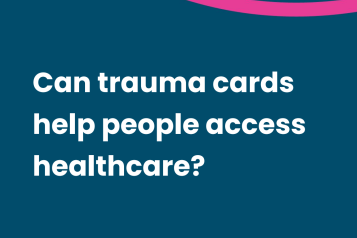Mental health and the journey to parenthood: Maxine's story

A closer look at one individual's experience of becoming a parent
Just weeks after Maxine gave birth to her daughter in 2016, she developed severe anxiety and was admitted to a Mother and Baby Unit to receive psychiatric care. She tells us about the multitude of factors that contributed to her illness, and the support she thinks new mothers need to help them stay well.
A difficult pregnancy
“I didn’t have an easy pregnancy. I was being sick up to about 26 weeks. It was really bad for two months and I had to stop working, which fed into my anxiety. I’m self-employed so I imagined working, earning and saving so I could have time with my baby.
"I went back to work when the sickness died down a bit but I was still nauseous for a long time. I had lots of other pregnancy-related issues, like not being able to sleep. We also moved house when I was 37 weeks pregnant, which was obviously stressful. I have a history of anxiety and depression.
An unexpected caesarean
“I was hoping to have a natural birth, but then I found out my baby was breech and three days later I was being wheeled in for a caesarean. I hadn’t mentally prepared for it.
"I had her on a Thursday in 2016 and I cannot fault the theatre staff. I had my baby, which was fantastic. I had a great first night and the nurses were very attentive.
"The next day the ward was chaos, and it was clear I was going to be sent home as soon as possible. The questions from staff changed from ‘Are you OK?’ to ‘You’re OK, aren’t you?’.
"I don’t for a minute fault the nurses and doctors, as they have no choice. As far as they can see, clinically I’m going to be OK. They don’t have the luxury of considering me mentally because they don’t have enough beds.
"I was sent home after just one night, I couldn’t really walk, I could only shuffle. I don’t want to be critical of the hospital, it’s not their fault, I’m sure they would have kept me in if they could.
A tough start at home
“Just before we left our house to go to the hospital on the Thursday morning my husband noticed our toilet was blocked and there was dirty water coming out.
"We were going to have our baby and I kept thinking I wanted a clean hygienic lovely environment, and we had this problem.
"When we came back home I was in bits as I had this baby with no immune system, and toilet water in the house. We called a company in to sort it out and they did a terrible job, there was dirt everywhere.
"I quarantined myself for a whole day in the lounge and felt so worried about germs coming in. We were sleep deprived, and my husband had to spend hours clearing up.
"All that time I wanted to protect my baby and it felt like we were surrounded by germs. It’s not the start you want.
"As well as that, some of my baby’s finger nails weren’t formed properly and were infected (paronychia). I was told I needed to bath each one in salt water for five minutes four times a day. Nobody told me how to do it, and she kept moving when I tried.
"These all sound like small things, but there was just so much to handle. And all the time I was struggling to breastfeed, too.
The impact of illness, sleep deprivation, and troubles breastfeeding
“I was discharged from hospital so quickly. They checked my baby was feeding and though she was getting nutrients, she wasn’t latching in a way that was comfortable for me. I managed to get a breastfeeding consultant who told me I was doing it wrong and why I was so sore.
"All of these issues started adding up. I got a urine infection, I had sore breasts, then we had a trip to A&E because every time we lay our daughter down it was like she couldn’t breathe. It was reflux, they told us at hospital. We were already sleep deprived so a night in A&E was tough.
"I was completely exhausted and then I got a horrible virus. I lost my baby weight in about three weeks and was thinner than I was before being pregnant.
"I was still trying my best to breastfeed and ended up so ill that I was in bed shaking with cold.
"Each time I became ill my mental health was deteriorating a little bit more. I kept thinking I should be caring for my baby but I can’t, why am I ill? I didn’t feel like I was functioning as a mother. I mentally collapsed.
One of the biggest worries for me and my family when I was becoming ill was what in earth are we going to do about this. Where are we going to turn?
"Because there is such an encouragement to breastfeed, I was desperately trying to express milk for her and I noticed I was starting to dry up.
"I felt like a failure because I’d not been able to breastfeed her. Even though I was physically and mentally ill by this point, I put so much effort into trying. I couldn’t even look at the formula my husband got as I felt like I’d failed.
"There are so many images out there of what perfect motherhood looks like. We need to get to a place where ‘good enough’ is what we aim for. A fed nourished happy baby is so much more important than a stressed unhappy mother trying to achieve unrealistic expectations.
"You’re so desperate to fulfil what you think is the right thing that you don’t realise it’s becoming counter-productive.
A downward spiral
"We were at a crisis point, not knowing where to go. My family was trying to cope with a newborn baby and me being ill. I had such limited knowledge about mental health and I’d never heard of a Mother and Baby Unit.
"The mental health crisis team tried to manage me in the community, but by that point I was so low and panicking about my husband going back to work. He was given four weeks’ leave and he’d taken an extra two because of the crisis I was in. He’d become our baby’s main carer.
"My mum was trying to tell me that she would manage but I feared everything would fall apart. I saw a perinatal psychiatrist and he said what I needed was hospital care and he was exasperated that my case hadn’t gone to perinatal sooner. I felt like I got to him quickly compared to other mums I’d heard about, but he was annoyed that I was a new mum, so should have gone straight to them.
"I felt a complete sense of hopelessness. It was a tremendous downward spiral in about two weeks. I’d gone from managing and coping to completely flat out not coping.
Admittance to a Mother and Baby Unit
“I was invited to look around the hospital. I had a strange mix of emotions – terror as I hadn’t been out of the house for two weeks, terror about going into hospital and what that would mean, and embarrassment that I needed this help. I shouldn’t have been thinking that, but I was.
"It was absolutely terrifying until I went to visit the unit. Seeing it immediately calmed me. What I saw was like a little home. It was so different from what I imagined.
"I didn’t know who I would be around – would there be women wailing and shrieking? But when I went in I thought: I’m going to be OK.
"I said to my husband ‘I need to move into this unit, don’t I. It’s our only option.’
The difference 48 hours can make
“Within 48 hours I’d gone from doing almost no care for the baby, to almost all her care, with supervision.
"Being there showed me that what lay at the heart of my frozen inability to cope was the terror of my husband going back to work and feeling there was nobody who could cope with what was happening.
"I thought I would be the one who doesn’t get better. But, the fact that support existed meant within 48 hours I felt a lot better.
"I can’t speak highly enough of the people in that unit – from the psychiatrists to the nurses to the support assistants.
"You are still a mother and an intelligent individual, you’re just poorly. So being spoken to with empathy and respect is so important. You also need a positive push and supportive firmness.
"It was also important for me that I was fully informed about why I was being put on certain medication and why decisions were being taken.
"I’m an intelligent person, I’m used to reasoning, and I don’t want to be kept in the dark. I did feel I was being informed about what was happening and why.
Have you been affected by this story?
If the content of this story causes you to think of anything that has happened to you or someone you know and you feel upset, worried or uncomfortable, please see the Maternal Mental Health Alliance's support page for a list of services who may be able to help.


